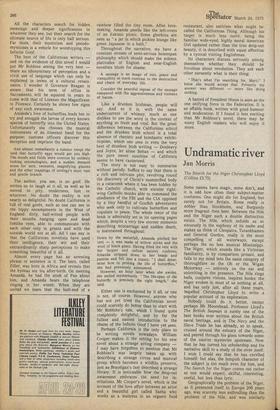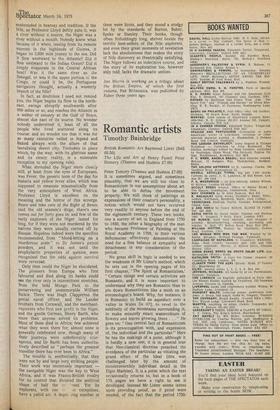Undramatic river
Jan Morris
The Search for the Niger Christopher Lloyd (Collins £2.75) Some names have magic, some don't, and it is odd how often their subject-matter conforms. One might die for England, but surely not for Britain. Rome really is nobler than Stockholm, and Burgundy more fragrant then beer. Between the Nile and the Niger such a double distinction exists. The Nile, which enfolds us so sinuously in the euphony of its nafne and makes us think of Cleopatra, Tutankhamen and General Gordon, really is the most compelling of all waterways, except perhaps the no less musical Mississippi. The Niger, which sounds like a Victorian familiarity, is by comparison prosaic, and falls to my mind into the same category of thoroughfare as the Oh or the Wigan Motorway — unlovely on the ear and uninviting in the presence. The Nile rings bells, conjures visions, inspires books: the Niger evokes in most of us nothing at all, and has only just, after all these years, impelled Christopher Lloyd to write a popular account of its exploration.
Nobody could do it better, except perhaps Mr Moorehead. Professor Lloyd's The British Seaman is surely one of the best books ever written about the British naval heritage, and in The Navy and the Slave Trade he has already, so to speak, cruised around the estuary of the Niger, and peered through his glass towards some of the nastier mysteries upstream. Now that he has turned his scholarship and his narrative skill to a study of the river itself.
I wish I could say that he has excelled himself: but alas, the lumpish character of the subject is too much even for him, and The Search for the Niger comes out rather as one would expect, skilful, interesting, useful, but less than lyric.
Geographically the problem of the Niger, as it presented itself to Europe 200 years ago, was scarcely less enthralling than the problem of the Nile, and was similarly enshrouded in hearsay and tradition. If the Nile, as Professor Lloyd deftly puts it, was a river without a source, the Niger was a river without a mouth. Nobody knew what became of it when, issuing from its remote sources in the highlands of Guinea, it began its 2,600 mile jouney to the sea. Did it flow westward to the Atlantic? Did it flow eastward to the Indian Ocean? Did it simply evaporate in the Central African heat? Was it the same river as die Senegal, or was it the upper portion of the Congo, or could it be, the Portuguese navigators thought, actually a westerly branch of the Nile?
In fact, as doubtless I need not remind You, the Niger begins its flow to the north east, swings abruptly southwards after 800 miles or so, and reaches the Atlantic in a welter of estuary at the Gulf of Benin, almost due east of its source. No wonder nobody understood it, least of all the people who lived scattered along its course; and no wonder too that it was for so many centuries veiled in legend and linked always with the allure of that tantalising desert city, Timbuktu (a place Which, by the way, with its glorious name and its sleazy reality, is a miserable exception to my opening rule).
What shrouded the Niger more close:y still, at least from the eyes of Europeans, Was Fever, the generic term of the day for malaria and yellow fever alike, which was supposed to emanate miasmatically from the very atmosphere of West Africa, Professor Lloyd is excellent on the meaning and the horror of this scourge. Beare and take care of the Bight of Benin, said the old seamen's dirge, there's one comes out for forty goes in: and few of the early explorers of the Niger lasted for long, for if they were not murdered by the natives they were usually carried off by disease. Hopeless indeed were the specifics recommended, from "blood-letting on a murderous scale" to Dr James's patent Powders, and it was not until the Prophylactic properties of quinine, were recognised that the odds against survival were reversed.
Only then could the Niger be elucidated. The pioneers from Europe who first laboured and died along its banks could see the river only in intermittent stretches, from the bold Mungo Park to the perservering and unmemorable William Baikie. There was Hugh Clapperton the genial naval officer, and the Lander brothers from Cornwall, and the merchantexplorers who first saw profit in the Niger, and the gentle German, Henry Barth, who more than anyone solved its problems. Most of them died in Africa; few achieved What they went there for; almost none is generally celebrated now, though many of their journeys were unbelievably courageous, and Dr Barth has been authoritatively described as " perhaps the greatest traveller there has ever been in Africa."
The trouble is, aesthetically, that they were not by and large very, striking people. Their work was immensely important — the navigable Niger was the key to West Africa, and it was Franco-British rivalry for its control that dictated the political Shape of half the cc 'nent. Yet its explorers, with one -,. vo exceptions, have a pallid air. A depre sing number ot them were Scots, and they sound a stodgy lot by the standards of Burton, Baker, Speke or Stanley. Their books, though often forbiddingly long, shrivel beside the terrific best-sellers of the Nile explorers, and even their great moments of revelation lack the absoluteness that makes the story of Nile discovery so theatrically satisfying. The Niger follows an indecisive course, and the story of its exploration too, however ably told, lacks the dramatic unities.
Jan Morris is working on a trilogy about the British Empire, of which the first volume, Pax Britannica, was pub;ished by Faber three years ago



































 Previous page
Previous page